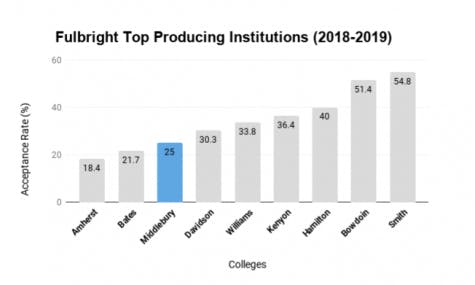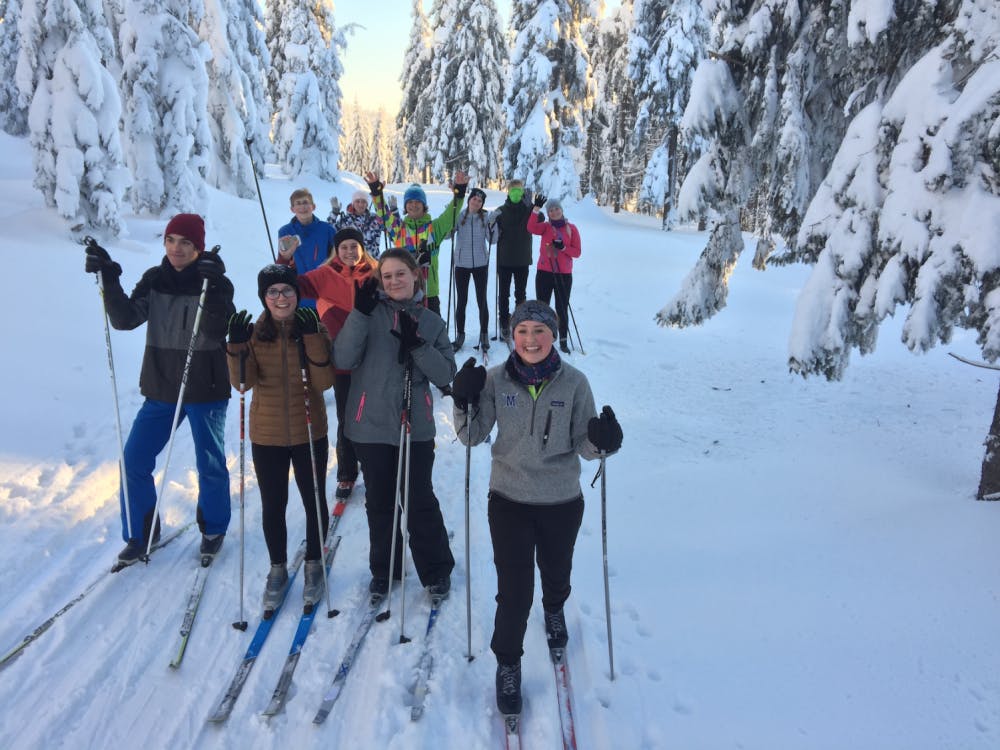The U.S. Department of State has named Middlebury a top producer of Fulbright U.S. Students and Fulbright U.S. Scholars. Three college faculty members along with 10 students and recent alumni received Fulbright grants for the 2018-2019 academic year.
The prestigious and competitive Fulbright program, established in 1946 by the Bureau of Educational and Cultural Affairs of the U.S. Department of State, is open to U.S. citizens and operates in more than 140 countries. The program awards its 8,000 annual grants to college students through the Fulbright U.S. Student program and college faculty through the Fulbright U.S. Scholar program.
Fulbright students pursue two types of international work, English teaching and study and research. While individual countries determine the number and placement of assistant English teachers they receive through the Fulbright program, study and research applicants are responsible for developing their own projects and finding host universities within their target country. Research funded by the Fulbright encompasses most academic disciplines.
Middlebury is consistently listed as a top producer of both students and scholars. This year, it is one of just 11 institutions nationally, including seven baccalaureate colleges, to be ranked for both Student and Scholar grants. The college is ranked seventh among Bachelor’s institutions, tied with Davidson College and Hamilton College, for its total number of Fulbright Student grants, and tied first for Scholar grants with Colgate University and Trinity College.
“One of the things that is really key here is that our students study abroad, and they actively learn other languages, and they’re interested in other cultures,” said Lisa Gates, Associate Dean for Fellowships and Research. Gates is one of the students’ primary resources throughout the extensive Fulbright application process.

Midd Among Top Fulbright Producers
Samuel Finkelman ’14 referenced many of these same factors as the reasons he pursued a Fulbright year in Russia. “My decision to study Russian language, literature, culture and history at Middlebury was truly life-changing,” he said. “This decision, and especially my experience studying abroad in Irkutsk during the spring of my junior year, convinced me that I wanted to continue engaging intellectually and professionally with the post-Soviet space.”
Finkelman went on to live in Krasnoyarsk, Siberia, while teaching English at Siberian Federal University.
“I began to learn the boundlessly difficult art of teaching, and I continued pursuing my own love for Russian language and literature,” he said. “Without a doubt, the Fulbright year was key in setting me on the path that has led me to where I am today: pursuing a PhD in Russian and Soviet history at University of Pennsylvania.”
Another reason Gates cited for the strong candidacy of Middlebury students is the college’s strong culture of senior work. She said that over half of Middlebury students do some form of senior work, including the senior thesis and senior research, adding, “Having that experience is also really important...in terms of being competitive in the applicant pool and being prepared to be successful when you’re on the ground and doing the work.”
Fulbright students identified the Center for Teaching Learning and Research (CTLR) as a particularly helpful resource during the grant application process.
“The CTLR staff constantly reminded us of upcoming deadlines, offered useful feedback on personal statements,” said Georgia Grace Edwards ’18, a current Fulbright student teaching English in the Czech Republic. “They wrote wonderful letters of recommendation and challenged us to think critically and creatively about how and why a Fulbright would be beneficial to both us and our chosen communities abroad.”
The CTLR works with seniors and recent graduates during the application process. Each year, approximately a quarter of Middlebury’s Fulbright applicants are alumni.
“I applied as an alumna, so I had the option to either apply through Middlebury or ‘at large,’ but I knew of Middlebury’s strong track record of Fulbright scholars and other grantees, and also I had pleasant experiences with the Fellowships and Research team prior to graduating,” said Brennan Delattre ’16, a current Fulbright student whose research investigates the positive impact of cooperative movement in Brazil. She became interested in the topic during her time at Middlebury and pursued it in her senior thesis.
Elena Cutting ’14 described the application process as longer for research applicants than for teaching applicants, because of the statement of grant purpose required alongside the personal statement.
“Unlike any other scientific grant you will ever apply for, this research proposal is going to be reviewed by non-scientists,” she said. “So you have to be really careful to break down complex methods or ideas that may seem commonplace in the lab down into digestible bits of information.”
Cutting, who spent her Fulbright year at the National Center for Oncologic Investigation in Madrid, Spain, said she decided to become a doctor during the eight months she spent in Argentina in high school. For her, the Fulbright was an opportunity to spend a year doing something different before entering medical school.
Gates emphasized how the Fulbright Scholar program focuses on international academic exchange, allowing college faculty to conduct research at universities abroad. “It supports bringing scholars from other countries to the United States and supports scholars going to other countries,” she said.
The three faculty members abroad this year are Mez Baker-Médard, assistant professor of environmental studies, Svea Closser, former associate professor of sociology and anthropology and Carrie Anderson, assistant professor of history of art and architecture.
Anderson said she applied for a Fulbright scholar grant for a number of reasons, including the chance to live in a country that had long been a subject of her research. “The prospect of living for a year in the country that has been the primary focus of my research and teaching was particularly appealing,” she said. “I knew it would enable me to teach directly from paintings and objects housed in some of the most amazing collections of Dutch art in the world.”
Anderson has not been disappointed with the research materials she has worked with since arriving in the Netherlands. She has also found the experience rewarding beyond the research opportunities.
“I have also met so many amazing people during my time here so far,” she said. “Other fulbrighters, students, faculty, neighbors, friends. I feel so fortunate to be a part of this incredibly welcoming and generous community.”
Professor of Economics Jon Isham spent the 2016-2017 academic year as a Fulbright Scholar developing and teaching a social entrepreneurship course at Ashesi University in Ghana. He spoke highly of the Fulbright program’s generous financial support and the effort it put into integrating his family into the embassy community.
“The Fulbright is a wonderful thing, and faculty know that,” Isham said. “Franci Farnsworth in the grants office is a tremendous aid and carries decades of experience to make the process both understandable and efficient, and she plays a big role in the success that Middlebury faculty have had getting Fulbrights.
“For most of us, it’s a once-in-a-career opportunity, and I certainly feel very lucky that I got one,” Isham said.
20 of the 31 Middlebury seniors and alumni who applied for Fulbright grants for the 2019-2020 academic year were selected as semifinalists, and will hear back about moving forward in the process between March and April.
Midd Named Top Fulbright Producer

YUNFAN CHEN, ADRIENNE COSLICK
Comments



